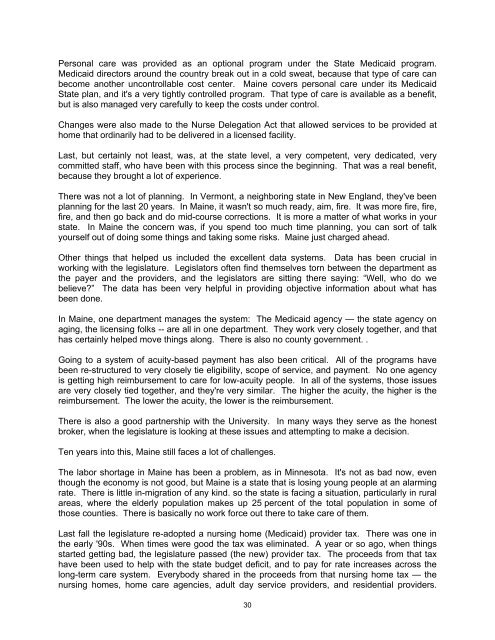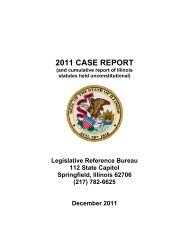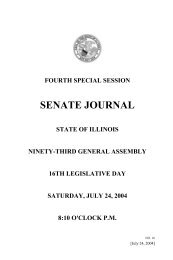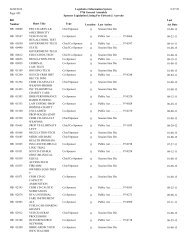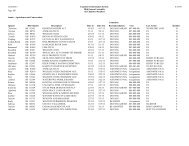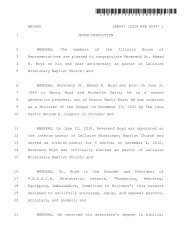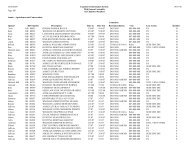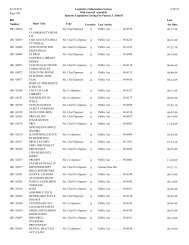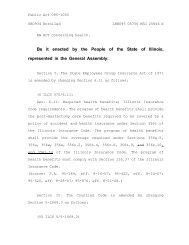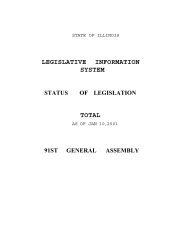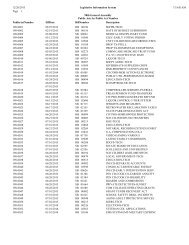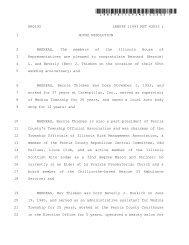Long-Term Care - Illinois General Assembly
Long-Term Care - Illinois General Assembly
Long-Term Care - Illinois General Assembly
Create successful ePaper yourself
Turn your PDF publications into a flip-book with our unique Google optimized e-Paper software.
Personal care was provided as an optional program under the State Medicaid program.<br />
Medicaid directors around the country break out in a cold sweat, because that type of care can<br />
become another uncontrollable cost center. Maine covers personal care under its Medicaid<br />
State plan, and it's a very tightly controlled program. That type of care is available as a benefit,<br />
but is also managed very carefully to keep the costs under control.<br />
Changes were also made to the Nurse Delegation Act that allowed services to be provided at<br />
home that ordinarily had to be delivered in a licensed facility.<br />
Last, but certainly not least, was, at the state level, a very competent, very dedicated, very<br />
committed staff, who have been with this process since the beginning. That was a real benefit,<br />
because they brought a lot of experience.<br />
There was not a lot of planning. In Vermont, a neighboring state in New England, they've been<br />
planning for the last 20 years. In Maine, it wasn't so much ready, aim, fire. It was more fire, fire,<br />
fire, and then go back and do mid-course corrections. It is more a matter of what works in your<br />
state. In Maine the concern was, if you spend too much time planning, you can sort of talk<br />
yourself out of doing some things and taking some risks. Maine just charged ahead.<br />
Other things that helped us included the excellent data systems. Data has been crucial in<br />
working with the legislature. Legislators often find themselves torn between the department as<br />
the payer and the providers, and the legislators are sitting there saying: “Well, who do we<br />
believe?” The data has been very helpful in providing objective information about what has<br />
been done.<br />
In Maine, one department manages the system: The Medicaid agency — the state agency on<br />
aging, the licensing folks -- are all in one department. They work very closely together, and that<br />
has certainly helped move things along. There is also no county government. .<br />
Going to a system of acuity-based payment has also been critical. All of the programs have<br />
been re-structured to very closely tie eligibility, scope of service, and payment. No one agency<br />
is getting high reimbursement to care for low-acuity people. In all of the systems, those issues<br />
are very closely tied together, and they're very similar. The higher the acuity, the higher is the<br />
reimbursement. The lower the acuity, the lower is the reimbursement.<br />
There is also a good partnership with the University. In many ways they serve as the honest<br />
broker, when the legislature is looking at these issues and attempting to make a decision.<br />
Ten years into this, Maine still faces a lot of challenges.<br />
The labor shortage in Maine has been a problem, as in Minnesota. It's not as bad now, even<br />
though the economy is not good, but Maine is a state that is losing young people at an alarming<br />
rate. There is little in-migration of any kind. so the state is facing a situation, particularly in rural<br />
areas, where the elderly population makes up 25 percent of the total population in some of<br />
those counties. There is basically no work force out there to take care of them.<br />
Last fall the legislature re-adopted a nursing home (Medicaid) provider tax. There was one in<br />
the early '90s. When times were good the tax was eliminated. A year or so ago, when things<br />
started getting bad, the legislature passed (the new) provider tax. The proceeds from that tax<br />
have been used to help with the state budget deficit, and to pay for rate increases across the<br />
long-term care system. Everybody shared in the proceeds from that nursing home tax — the<br />
nursing homes, home care agencies, adult day service providers, and residential providers.<br />
30


